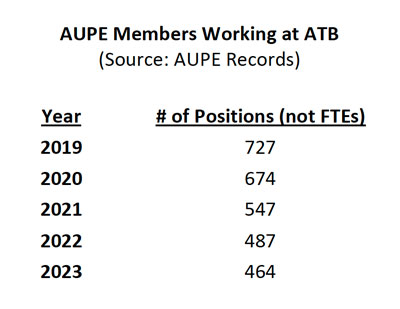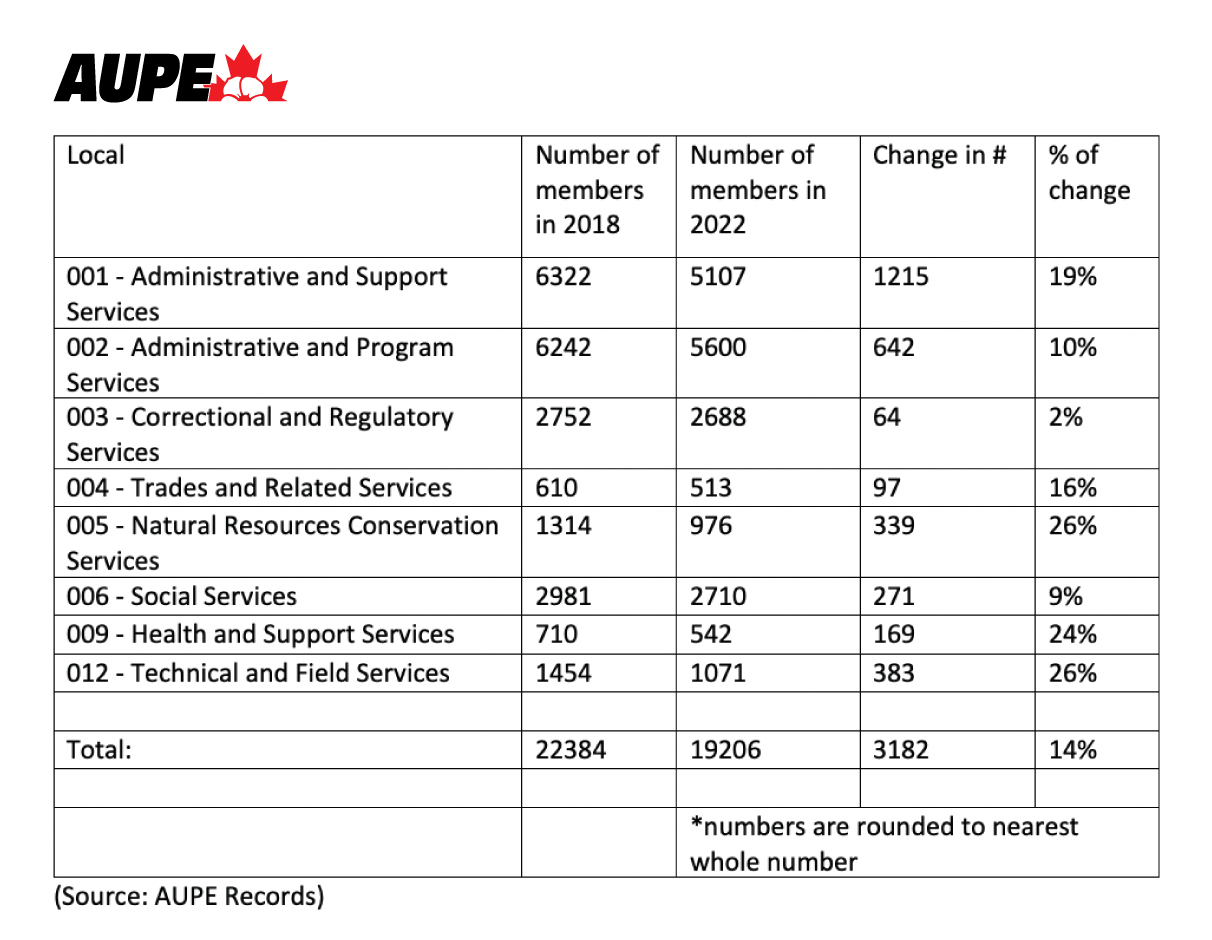ANALYZING BUDGET 2023 BY SECTOR
After almost four years of sustained attacks on public services and the workers who deliver them, the UCP budget delivered earlier this week might be the clearest case of a wolf showing up in sheep’s clothing we are ever likely to see. With just 87 days to go until election day, Budget 2023 is clearly designed to lure Albertans into forgetting some of the more radical ideas the premier has floated, some as recently as a few weeks ago. AUPE’s team of researchers went beyond the headlines to take a close look at what Budget 2023 means for AUPE members, by sector.
Economic Forecast
The government is forecasting 2.8% Gross Domestic Product (GDP) growth in 2023 and 3.0% in 2024. If their predictions are accurate, this would mean additional 0.5% wage increases for members who have collective bargaining agreements with “Gain sharing formulas” built in.
As members are well-aware, this won’t even come close to helping folks make ends meet. While the budget boasts that collective agreements negotiated over the past few years “have reasonable wage increases that are fair to both taxpayers and bargaining unit members,” we know that nothing could be further from the truth.
The effects of record-breaking inflation in 2022 haven’t let up. Members know food costs are up about nine per cent year over year (YoY); shelter costs are up over six per cent YoY; utilities are up 13.7% YoY; and, gasoline prices are up over twenty per cent YoY. This impacts lower income earners the hardest.
At the same time, price gouging by corporations has resulted in massive corporate profits which increased by a whopping 285 per cent in 2021 and 55 per cent in 2022. By cutting corporate tax rates from 12 per cent to 8 per cent, as they did in 2019, the government chose to leave $3 Billion in annual revenue on the table, while telling Albertans we couldn’t afford the essential public services they rely on.
The new “Fiscal Framework” announced in Budget 2023 is likely to negatively impact AUPE members in the future. The Fiscal Framework mandates balanced budgets, meaning that should oil and gas revenues suffer a significant downturn (as they inevitably do), the government will be required to make budget cuts, rather than run a deficit. With public sector compensation accounting for roughly 50 per cent of operating expenditures, our members will feel the effect at negotiating tables and through austerity measures.
Health
Members working short on the front lines expecting relief from this budget may find themselves still waiting. While the health budget sees an increase of approximately 4.2 per cent, this does not keep pace with population growth and inflation, which were 5.4 per cent combined for this year. An additional $307 million would have needed to have been budgeted just to maintain the status quo, which we all know is already unsustainably short-staffed.
Alberta Health Services (AHS) reported on Monday that they have added 400 frontline support workers since November 2022 and are planning to hire 420 more. While we appreciate this news, given the number of vacant positions already going unfilled, it may be some time before members see the significant day-to-day pressures ease, particularly in rural health centres and hospitals.
The government shows no signs of slowing down on their agenda to privatize health care delivery, with AHS reporting that by March 31, 2023, chartered surgical facilities will have completed 290,000 surgeries (a 4% increase from the previous year). Despite the absence of any evidence that chartered surgical facilities more efficiently completed these surgeries than expanding public surgical facilities in hospitals would have, the government is forging full speed ahead and expanding this privatization initiative in the coming year.
Continuing Care/Long-term Care
Although the government is boosting funding for Community Care, Continuing Care, and Home Care (up 15.3 per cent or $570 million from 2022-23 forecasts), their continued commitment to having the private, for-profit sector deliver these services does not bode well for Alberta’s rapidly aging population or our members who care for them.
Seniors Care in Long-term Care Assessment of Implementation Reportwas tabled in the legislature in February of this year by Alberta’s Auditor General. It assessed whether the government and AHS had followed through on recommendations that had been made in a 2014 Auditor General’s report on seniors living in long-term care facilities. The 2023 report found that two key recommendations from 2014 had still not been implemented: AHS has still not put a system in place to mitigate the risk of facilities being unable to provide the full-time staff necessary for safe, quality resident care and Alberta Health still needs to improve its public reporting on the long-term care system.
A second Auditor General’s report tabled that same February day, COVID-19 in Continuing Care Facilities examined the responses of Alberta Health and AHS in 355 care homes between March and December 2020. This period saw 379 outbreaks, 8,300 confirmed COVID-19 infections and 1,037 deaths of residents in those homes, as well as the deaths of five staff, including AUPE members.
The Auditor General found that having enough staff to provide safe care during an outbreak was a persistent, systemic problem. During a press conference announcing his findings, he expressed alarm at how few employees in LTC/CC were full time employees.
“I’d expect to see a model like that in a fast-food franchise but not in organizations that are caring for the vulnerable,” he told reporters.
What was known a decade ago and became painfully apparent during the early waves of the COVID-19 pandemic remains unaddressed by this budget. While we are pleased to see investments in Bridgeland Continuing Care Centre in Calgary and the Gene Zwozdesky Centre in Edmonton (where our members at CareWest and CapitalCare, respectively, care for residents), the government remains inclined to rely on the private, for-profit companies. These companies lead the way in minimizing full-time employment and adequately compensating their staff, which is inconsistent with the auditor general’s recommendations.
Mental Health and Addictions
Budget 2023 underlines the government’s commitment to a recovery approach to mental health and addictions services with funding provided for recovery centres in Red Deer, Lethbridge and Gunn. The government awarded contracts to run these facilities to an unnamed private operator or operators last August.
The recovery center in Gunn will be located at the former McCullough Centre. The provincial government closed the facility in February 2021, laying off 63 employees for a purported savings of $3 million annually. This was after the previous government had performed substantial renovations and constructed a brand-new building that was never used before the UCP government closed the Centre.
Services to be provided at the reopened facility will be substantially similar to those provided by provincial employees at the previously shuttered facility. Therefore, this represents the privatization of public services. The province claimed that the previous centre was closed due to low utilization, however at the of its closure the facility had a waiting list of 150 persons.
Education
Advanced Education
After gutting advanced education financing by more than 18 per cent during their first three years in government, the province is granting a 0.6% increase in funding in the next fiscal year. They have also imposed a two per cent cap on tuition starting next year and expect post-secondary institutions to increase their own revenue-generation by over five per cent.
The government-imposed financial squeeze these institutions found themselves in led to significant labour unrest at some universities and colleges last year as Boards of Governors sought to alleviate their financial pressures on the backs of its workers. We can expect more of the same challenges when we head back to bargain with these employers, as well as continued threats to contract out the remaining support services that our members provide.
K – 12
With an overall increase in operational spending of 9.4 per cent over the previous year’s budget, Budget 2023 increases Alberta’s operating budget for K-12 education dramatically. However, there is no way of determining how much of this operational funding is going to go to private and charter schools. We can see that funding for new school construction for private school and charter schools exceeds funding for public schools (including catholic and francophone schools).
The $433 million increase in operational funding is a significant increase but it falls short of what would be required to bring Alberta up to the national average on per-student spending. A press release issued by the Alberta Teachers Association on Feb. 26 cited Statistics Canada data that showed Alberta was dead last in K-12 spending, which it would need to boost by $1.2 Billion to bring it to the average.
The province has committed targeted funding of $126 million over three years to increase staffing and training opportunities, as well as hire more specialists such as counsellors, psychologists, and interpreters to support mental health. That sounds like a lot of money but with 379 school districts (not to mention the charter and private schools this government is so fond of), this breaks down to $110,817 per district per year. How many Educational Assistants does the UCP think this will enable districts to hire?
Boards, agencies and local government
Funding for boards, agencies and municipalities has been sustained or received modest increases.
While the budget doesn’t break down the number of FTEs working for local governments, our records show the number of AUPE members working in that sector has dropped from 1,582 in 2019 to 1,433 in 2023, with the same amount of work needing to be done. Hopefully, the province’s improved fortunes trickle down to municipalities so that these members get some much-needed assistance at work.
ATB Financial net income is forecast at $279 million in 2023-24, $3 million lower than this year, but is projected to grow $79 million to $358 million by 2025-26. Budget 2023 is silent on FTEs at ATB, however AUPE has seen a drop in the number of members over the last four years. We hope that ATB’s improved financial outlook might see those numbers improve.

Alberta Gaming, Liquor and Cannabis Commission (AGLC)’s net income from gaming and lottery activities, liquor and cannabis is expected to remain relatively constant at $2.3 billion over 2022-23 to 2024-25, after recovering in 2022-23 from pandemic restrictions. Net income then increases $78 million in 2025-26 when it reaches $2.4 billion. The budget does not identify the number of FTEs AGLC is forecasting. AUPE records show a drop in AGLC members over the past two years and hope to see gains there as their revenue improves.

Increased Legal Aid funding of $24 million in 2023-24, $31 million in 2024-25, and $35 million in 2025-26 suggests that FTEs, which were decreased significantly in 2019/20 and then brought back up this year, will remain static or increase.
Budget 2023 show increases in FTEs at Alberta Pensions Services Corporation (13) and Alberta Innovates (seven).
Government Services
AUPE has lost almost 3,200 Government of Alberta (GoA) members since the UCP assumed power in 2019. More than half of these losses (1,857) have occurred in Locals 001 and 002 (Administrative and Support Services and Administrative and Program Services). According to Budget 2023, 1,591 FTEs will be hired in 2023-24, recovering about half of the jobs lost during the UCP’s term in government.


These projected FTE gains are disproportionate by ministry, with nearly a third of the positions going to Justice and Public Safety and Emergency Services. The latter receives funding for 245 additional sheriffs, with the budget mentioning Sheriffs’ expanding roles in provincial law enforcement.
The Justice department also sees a significant increase in operations funding for corrections services, from $288 million in fiscal year 2022/23 to $340 million in 2023/24.
Children’s Services, where our members have seen significant caseload increases and have been working short-staffed for many years, is allotted only 11 new FTEs.
Others, like Infrastructure, will see a small boost (seven FTEs next fiscal year) that doesn’t even come close to the 156 FTEs that have been lost since 2019. Our members, who have been shouldering the additional workload due to these job cuts, will continue to do so.

The chart above offers a look at how the cuts inflicted by the UCP affected AUPE membership by Local and how this budget doesn’t come close to restoring the staffing levels necessary to provide quality public services. Budget 2023 demonstrates, if nothing else, that this government has no problem hiring and firing based on the price of oil and gas rather than on the actual needs of Albertans.
Conclusion
Budget 2023 is, as many commentators have noted, is a pre-election budget. It is almost as interesting to note what the budget doesn’t mention as it is to discuss what it does. Alberta’s new premier has floated several radical ideas in the past, some as recent as a few weeks ago. None of them (taking Albertans out of CPP, handing over billions of dollars to oil companies to clean up the messes they are already legally obligated to clean up, having Albertans fundraise for necessary medical procedures that their Health Spending Accounts don’t cover, etc.) appear in this budget. That doesn’t mean they won’t resurface after election day.
During the first wave of the COVID-19 pandemic, now Premier Smith suggested putting patients in hotels in a column she wrote. Last July, now Premier Smith laid out her plan to downsize the public service by “uber-fying government”. She has spent her entire public life demonizing government services and the workers who deliver them while trying to promote schemes to hand over more public resources to her friends in the private sector. She has delivered a budget that doesn’t advance that agenda for the simple fact that there is a provincial election in 87 days. We have little doubt that her agenda won’t rear its ugly head if she is successful in getting her government re-elected in 87 days.
It brings to mind that familiar Maya Angelou quote: “When someone shows you who they are, believe them the first time.”
